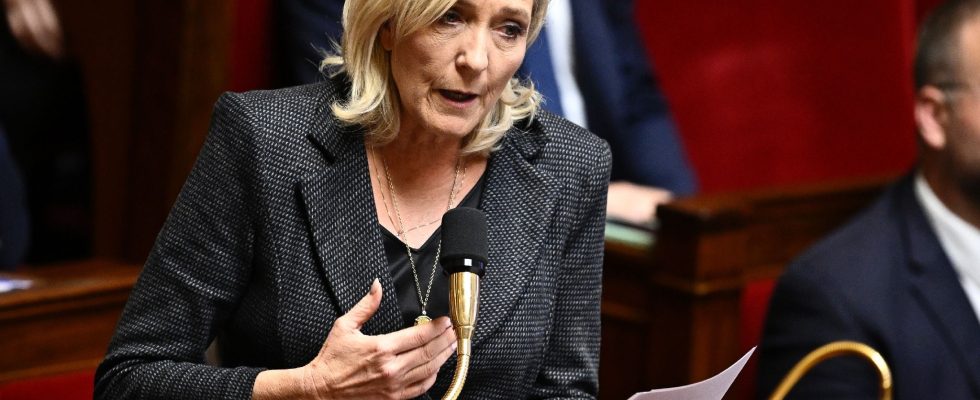1.4 million people in the streets in Germany last Sunday, against the AfD and its neo-Nazi connections. Marine Le Pen seems to have understood this well: her German partner is increasingly showing her radicalization, in the midst of turmoil for having advocated a form of “remigration”. While the RN is still seeking to gain notoriety and demonize itself, the leader of the French far right has chosen to raise her voice towards her German ally AfD, saying she is now ready to break with this party, which is nevertheless in the firmament in the polls.
This Thursday, January 26, during a press conference at the National Assembly, the three-time presidential candidate wanted to be clear: “We will be led to discuss together differences as important as these and see if they have or not […] consequences on our ability to ally ourselves in the same group.
In question, revelations published two weeks ago in the German media Correction : several leaders of the Alternative für Deutschland party (“Alternative for Germany”, AfD) participated in a meeting in November near Berlin in the presence of neo-Nazis, during which a plan for mass expulsion of foreigners or people of foreigners, including German citizens, were discussed. “I completely disagree with the proposal that would have been discussed or would have been decided within the framework of this meeting,” insisted Marine Le Pen, saying for her part she defended “all French people, whatever their conditions of acquisition of nationality. On Wednesday, RN deputy Jean-Philippe Tanguy had already called to “establish precisely what the AfD is becoming and what it wants to become”.
A total turnaround
This distancing is all the more surprising since in the European Parliament, RN and AfD sit in the same group – Identity and Democracy (ID) – where they have 18 and 10 seats respectively, out of 63 members. The German ally seemed all the more essential as it received 23% of voting intentions for the European elections, and as many potential troops to constitute a large “nationalist” group in the Strasbourg hemicycle, as desired by the RN.
In November, during an ID meeting in Lisbon, Marine Le Pen appeared without complexes alongside a leader of the AfD – as well as Jordan Bardella a month later in Florence – while spinning the metaphor of a group like “a co-ownership”, with “internal regulations, the main political ideas”, but where “everyone has their apartment decorated as you want”. What about the neo-Nazi connections of certain members of the sulphurous German party? “If one day there are comments that I consider to be incompatible with the values that are ours, we will say so, but that is not for the moment the case,” Marine Le Pen still evacuated to Portugal.
“Do not spend the electoral campaign reacting to what the AfD says or does”
But six months before the European elections, the tone is starting to change on the RN side. “Either the AfD is bound or it is not,” Marine Le Pen now rails in private, warning that she does not want to “spend the electoral campaign reacting to what the AfD says or does.” On Thursday, the warning was just as clear: “The alliances will be determined at the end of the elections”, declared the member of Parliament for Pas-de-Calais, warning against “certainties (which) could be shaken up”.
Asked by AFP, the German party did not comment on Marine Le Pen’s exit Thursday evening. The head of the AfD list in the European elections Maximilian Krah reacted to the media EURACTIV that “relations with our French colleagues remain good and cordial”, and that they had to date “no evidence of any attempt on the part of the French to exclude us”, considering this “unrealistic”.
By threatening out loud to break the Paris-Berlin axis, to the tune of “it is better to be alone than poorly accompanied”, the boss of the French far right nevertheless takes the risk of weakening her future group in the European Parliament – even if the excellent polls attributed to the list led by Jordan Bardella (around 30% voting intentions) and those of its other European allies seem at least to guarantee its sustainability.
Could his salvation come from Italy? Historical ally of Matteo Salvini’s League, struggling in voting intentions (8.5%), Marine Le Pen noted the kindness addressed to her at the beginning of January by Giorgia Meloni, the head of the transalpine government and patron of Fratelli d’Italia, with whom relations were until then notoriously cool. By recognizing Marine Le Pen for having “interesting reasoning”, Giorgia Meloni – whose party, credited with nearly 30% of voting intentions in the European elections, is rather close to the Zemmourists and does not sit in the same group as the RN in Brussels – seemed to hint at a slight inflection of appreciation. “I am delighted with this opening statement which, perhaps, will allow us tomorrow to debate common positions to defend within the European Parliament,” Marine Le Pen said with a smile. Allies may change.
